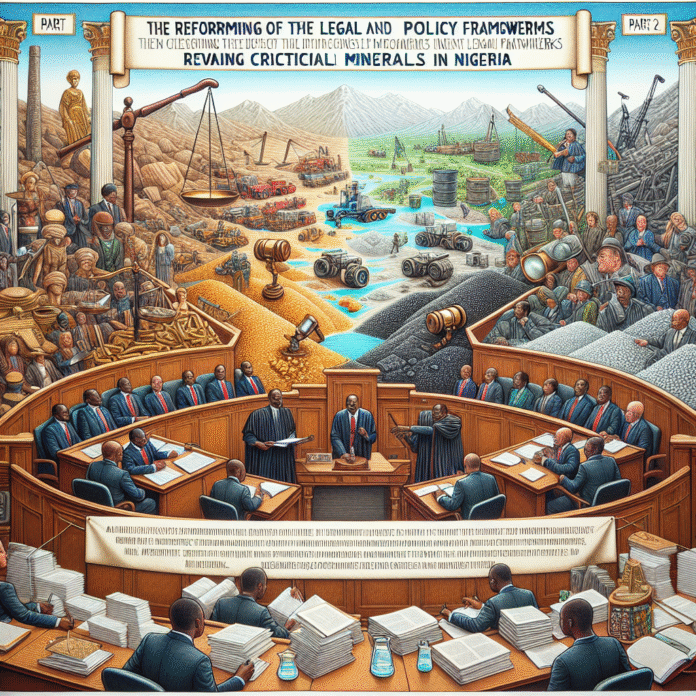Need for Legal and Policy Change in Nigeria’s Critical Minerals Sector
Advocating for Legal and Policy Reforms in Nigeria’s Critical Minerals Sector – Part 2
In light of the increasing global demand for critical minerals, Nigeria finds itself at a pivotal crossroads, necessitating comprehensive legal and policy reforms. These changes are essential not only to harness the country’s rich mineral resources but also to ensure sustainable development that benefits all Nigerians.
The Importance of Critical Minerals
Critical minerals, such as lithium, cobalt, and rare earth elements, are vital for various modern technologies, including renewable energy systems, electric vehicles, and advanced electronics. As the world transitions towards cleaner energy solutions, the demand for these minerals is set to surge. Nigeria, endowed with abundant mineral resources, has the opportunity to position itself as a key player in the global market. However, to realize this potential, a robust legal and regulatory framework must be established.
Current Challenges in the Sector
Despite its vast mineral wealth, Nigeria’s mining sector faces numerous challenges, including inadequate infrastructure, bureaucratic bottlenecks, and regulatory uncertainties. The existing legal framework is often outdated and fails to accommodate the complexities of modern mining operations. Moreover, issues related to land rights, environmental protection, and community engagement are frequently overlooked, leading to conflicts and environmental degradation.
Reforming Legal Frameworks
To attract investment and promote sustainable mining practices, Nigeria must reform its legal frameworks governing the mining sector. This includes modernizing the Mining Act to address current industry needs, providing clearer guidelines on mineral rights, and establishing transparent processes for obtaining licenses. Additionally, implementing strict environmental regulations and promoting corporate social responsibility can help mitigate the negative impacts of mining activities on local communities and ecosystems.
Policy Recommendations
1. **Establish a Clear Regulatory Framework**: The government should create an integrated policy framework that outlines the roles and responsibilities of various stakeholders in the mining sector. This framework should also promote collaboration between federal and state authorities to streamline processes and reduce bureaucratic challenges.
2. **Enhance Infrastructure Development**: Investment in infrastructure, such as roads, power supply, and water resources, is crucial for facilitating efficient mining operations. Public-private partnerships can be instrumental in driving infrastructure development in mining regions.
3. **Promote Local Content**: Policies that encourage the use of local labor and materials in mining operations can bolster economic growth and create job opportunities for communities. Training programs for local workers in mining and processing techniques can enhance their skills and employability.
4. **Strengthen Environmental Regulations**: Implementing stringent environmental protection laws is essential to safeguard Nigeria’s natural resources. Mining companies should be required to conduct environmental impact assessments and develop plans for rehabilitation of mining sites post-extraction.
5. **Engage with Local Communities**: Establishing effective communication channels between mining companies and local communities can foster trust and cooperation. Involving communities in decision-making processes and ensuring that they benefit from mining activities can reduce conflicts and enhance social license to operate.
Conclusion
The potential of Nigeria’s critical minerals sector remains largely untapped, but with the right legal and policy reforms, the country can unlock significant economic opportunities. By creating a conducive environment for investment and sustainable practices, Nigeria can not only meet the rising global demand for critical minerals but also ensure that its citizens reap the benefits of their natural resources. The time for action is now, and the path forward requires collaboration among government, industry stakeholders, and local communities to build a sustainable future for Nigeria’s mining sector.


